Introduction: Unlocking the Power of Nuts for Brain Health
In the search for optimal cognitive function, nutrition plays a profound role. While conversations often center around superfoods like blueberries or salmon, an equally powerful, yet sometimes overlooked, group of foods deserves attention: nuts. But are nuts good for brain health, and if so, which are considered the best nuts for brain health? Recent research offers compelling insights, suggesting that specific nuts may significantly support memory, focus, and overall brain vitality. This article will explore the latest scientific findings, including how nuts complement the benefits seen in multivitamin and memory studies, and why they may be an essential addition to a brain-boosting diet.
You may also like: Where to Buy Bacopa Monnieri: How to Find Quality Supplements for Cognitive and Memory Support
The Nutritional Profile of Nuts: A Foundation for Brain Health
Nuts are packed with critical nutrients that directly and indirectly support brain function. Rich in healthy fats, particularly monounsaturated and polyunsaturated fatty acids, they provide structural components essential for neuronal membrane health. Additionally, nuts offer a variety of vitamins and minerals, including vitamin E, magnesium, and B vitamins, each playing a role in cognitive resilience.
Vitamin E, abundant in almonds and hazelnuts, functions as a potent antioxidant that protects brain cells from oxidative stress. Magnesium, found in cashews and peanuts, is vital for synaptic plasticity, the foundation of learning and memory. Furthermore, nuts are a source of polyphenols, bioactive compounds that exhibit anti-inflammatory and neuroprotective properties. When considering the broader context of nutrition, multivitamin efficacy studies have consistently highlighted the importance of such micronutrients in maintaining cognitive performance, suggesting that nuts are a natural, food-based way to meet many of these critical needs.
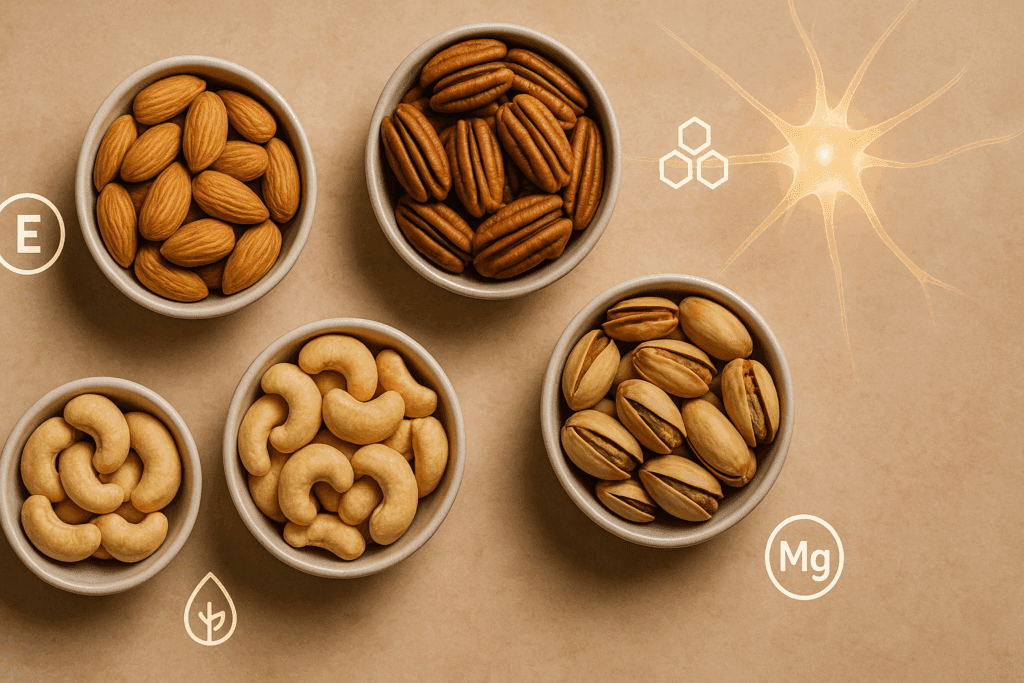
How Nuts Influence Cognitive Function and Focus
When we examine the mechanisms through which nuts influence brain function, several pathways emerge. First, the healthy fats within nuts contribute to the maintenance of the brain’s lipid-rich environment, ensuring optimal fluidity and function of neural membranes. This structural integrity facilitates better communication between neurons, enhancing focus and cognitive processing.
Moreover, nuts support cerebral blood flow. The nitric oxide-promoting effects of arginine, an amino acid prevalent in nuts like walnuts and peanuts, may enhance vascular flexibility and blood supply to brain tissues. Adequate blood flow is essential for delivering oxygen and nutrients, both of which are indispensable for cognitive activities.
Clinical trials exploring multivitamin and memory loss studies also underscore the benefits of consistent nutrient intake for brain endurance and mental clarity. In this way, nuts serve as a potent partner in cognitive nutrition, offering naturally occurring compounds that parallel the advantages seen in daily vitamin for memory loss regimens.
Almonds: The Cognitive Powerhouse
Among the best nuts for brain health, almonds consistently earn high marks. Rich in vitamin E, they protect neurons from oxidative damage, a factor implicated in cognitive decline and dementia. A handful of almonds can provide up to 37% of the daily recommended intake of vitamin E, reinforcing their role in brain preservation.
Almonds also contain riboflavin and L-carnitine, nutrients associated with neuroprotective benefits. Research investigating the potential of multivitamin dementia study interventions often highlights these very nutrients for their importance in slowing cognitive decline. Given this alignment, incorporating almonds into a brain-healthy diet represents a practical and scientifically sound strategy for enhancing cognitive longevity.
Walnuts: Nature’s Brain-Shaped Supernut
Walnuts are often recognized for their remarkable resemblance to the human brain, but their real value lies in their biochemical composition. They are a leading source of plant-based omega-3 fatty acids, particularly alpha-linolenic acid (ALA), which plays a crucial role in maintaining neuronal structure and function.
Emerging research suggests that regular walnut consumption can improve memory and learning skills. Additionally, studies on multivitamins and memory reveal a synergistic relationship between omega-3 fatty acids and certain vitamins, further emphasizing the comprehensive benefits of walnuts. For individuals seeking to support brain function through nutrition, walnuts present a dual advantage by offering both essential fatty acids and potent antioxidants.
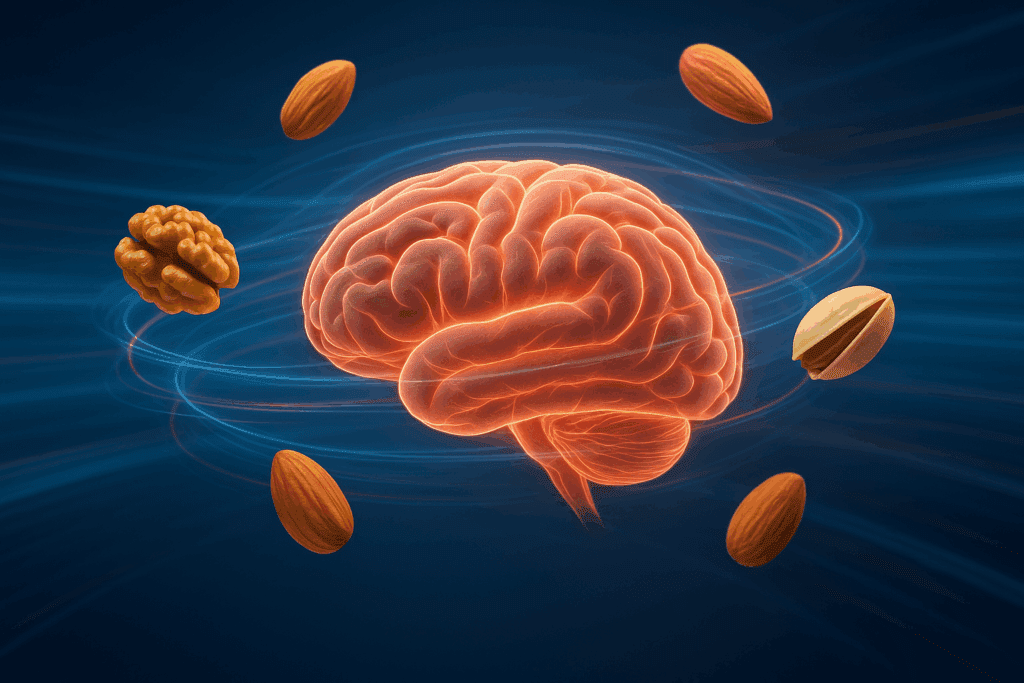
Cashews: A Rich Source of Brain-Friendly Minerals
Cashews stand out not only for their creamy texture but also for their impressive mineral profile. High in magnesium, zinc, and iron, cashews address several nutritional gaps linked to cognitive performance. Magnesium, in particular, is essential for NMDA receptor function, which governs synaptic plasticity and learning.
The link between mineral intake and cognitive outcomes is reinforced in various multivitamin research studies, where supplementation with magnesium and zinc has correlated with improvements in memory and executive function. Thus, cashews can serve as a delicious and practical way to meet daily mineral needs critical for brain vitality.
Pistachios: Tiny Nuts, Mighty Benefits
Pistachios may be small, but their impact on brain health is significant. They are rich in lutein and zeaxanthin, carotenoids traditionally associated with eye health but now increasingly recognized for their role in cognitive function. Their high content of gamma-tocopherol, a form of vitamin E, also enhances their neuroprotective profile.
Considering findings from the new study on vitamin supplements, which suggest that multiple nutrients working together yield superior cognitive benefits compared to isolated nutrients, pistachios emerge as a naturally balanced choice. Their unique combination of antioxidants and healthy fats makes them an excellent addition to a diet aimed at optimizing brain health.
Pecans: Antioxidant-Rich Allies for the Aging Brain
Pecans are one of the highest antioxidant-containing nuts, a feature that positions them as powerful defenders against age-related cognitive decline. Oxidative stress is a significant contributor to memory loss and neurodegeneration, making antioxidant intake a critical focus in multivitamin efficacy and multivitamin memory study research.
Regular consumption of pecans can help mitigate oxidative damage, supporting overall brain function and resilience. Given the growing body of evidence that multivitamins may slow memory loss, foods like pecans that naturally supply a variety of antioxidants and micronutrients can be an important component of preventive cognitive care strategies.
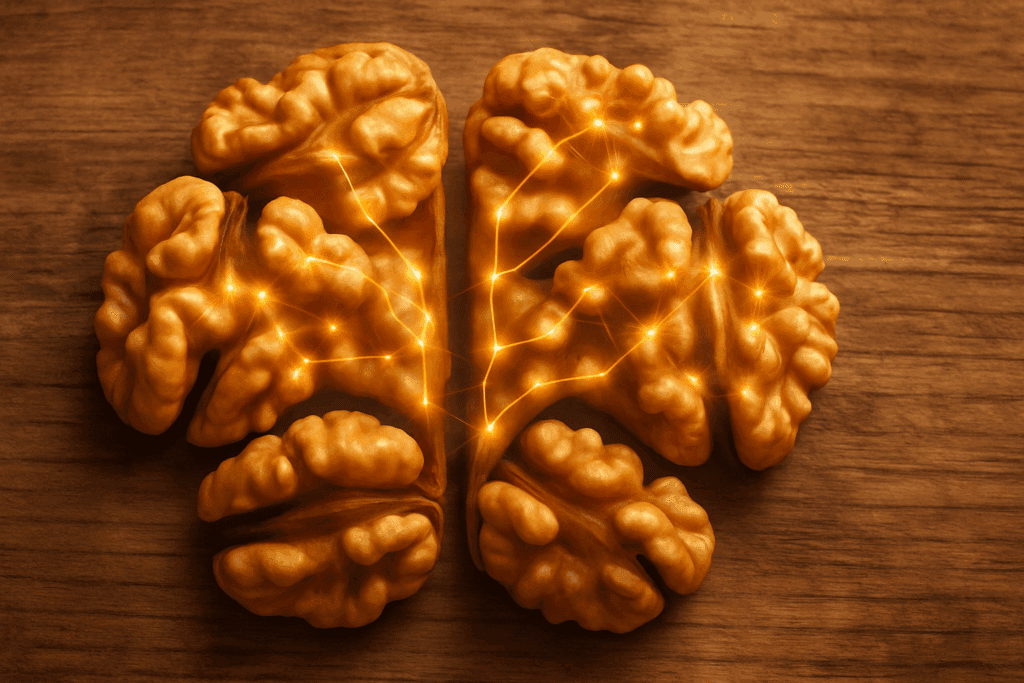
The Role of Multivitamins and Nuts in Cognitive Aging
The conversation about brain health would be incomplete without addressing the role of multivitamins alongside a nutrient-rich diet. Studies on multivitamin and memory loss study outcomes suggest that daily supplementation can modestly improve memory performance, particularly in aging populations.
However, experts emphasize that whole foods like nuts offer a complex matrix of nutrients that work synergistically in ways that isolated vitamins cannot fully replicate. In this context, the inclusion of nuts complements a comprehensive cognitive wellness plan. As the latest multivitamin news highlights, real-food sources of vitamins and minerals remain irreplaceable pillars of nutritional health.
Practical Tips for Incorporating Nuts into a Brain-Healthy Diet
Incorporating nuts into your daily routine is simple yet impactful. Aim to consume a variety of nuts rather than relying on a single type, as each offers a unique nutritional profile. A small handful of mixed nuts can provide a broad spectrum of brain-supportive nutrients without excessive caloric intake.
Pairing nuts with other nutrient-dense foods, such as berries or leafy greens, can further amplify their cognitive benefits. This approach mirrors findings from multivitamin dementia study research, which suggest that combinations of nutrients yield better outcomes than single-nutrient interventions. Moreover, choosing raw or dry-roasted nuts without added sugars or oils helps preserve their natural health benefits.
Understanding the Science: How Multivitamins and Nuts Complement Each Other
When exploring the multivitamin memory study literature, a recurring theme emerges: nutrient diversity matters. Multivitamins often provide baseline levels of essential nutrients, while nuts deliver these nutrients in their bioavailable, food-based forms, along with additional bioactives not typically found in supplements.
For example, the polyphenols in walnuts or the lutein in pistachios may work in tandem with standard vitamins found in multivitamin supplements, enhancing antioxidant defenses and supporting mitochondrial function. The vitamin supplement study data increasingly supports the notion that diet and supplementation are best viewed as complementary strategies rather than competing ones.
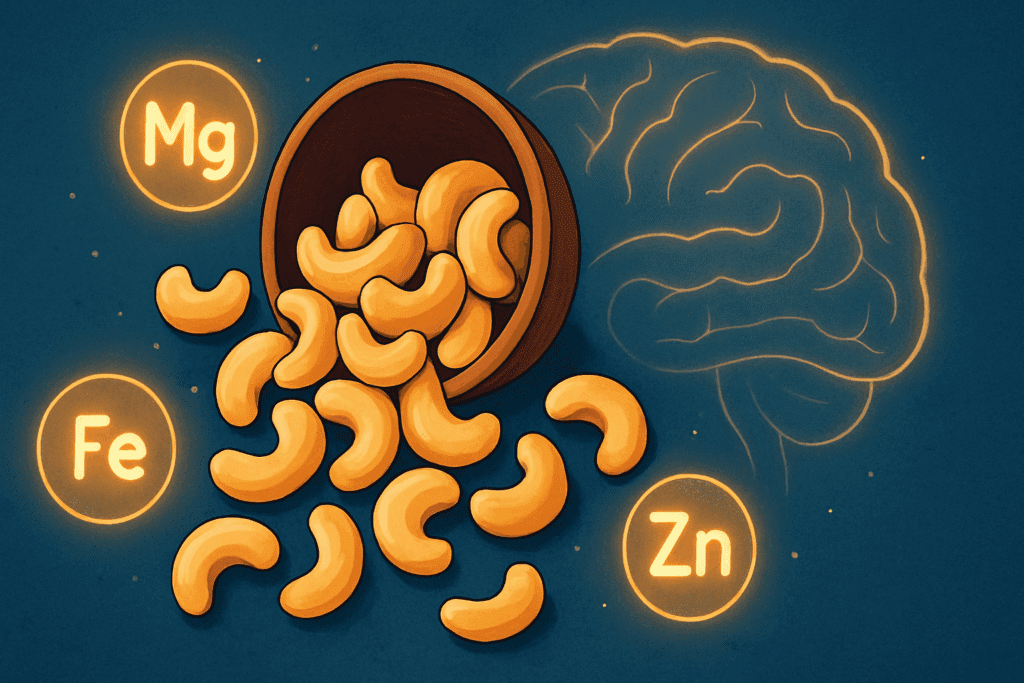
Multivitamins May Slow Memory Loss: What This Means for Nut Enthusiasts
The promising findings that multivitamins may slow memory loss underscore the critical importance of proactive nutritional strategies throughout life. For individuals who already consume a daily vitamin for memory loss prevention, incorporating nuts can enhance these efforts by delivering additional neuroprotective compounds.
Studies suggest that starting such interventions earlier in adulthood yields better outcomes, reinforcing the idea that habits formed today will profoundly influence cognitive resilience decades down the road. This perspective aligns with the evolving consensus from multivitamin research that long-term, consistent nutrient support is more effective than short-term interventions.
Should Seniors Take a Multivitamin? The Role of Nuts in Senior Nutrition
As we age, nutrient absorption often declines, making supplementation increasingly relevant. The question “should seniors take a multivitamin” is one that geriatric nutritionists frequently address, and the consensus is generally affirmative, particularly when dietary intake is insufficient.
Nuts can play a vital role in senior nutrition by providing easily digestible, nutrient-rich calories that support both brain health and overall vitality. Their soft textures (in varieties like cashews or walnuts) are often easier for seniors to consume compared to harder foods, making them a practical dietary addition alongside a multivitamin regimen.
Exploring the Latest Multivitamin Research: Food and Supplements in Harmony
New findings in multivitamin research suggest a shift away from viewing supplements as magic bullets and toward an integrated approach that includes both high-quality supplementation and nutrient-dense whole foods. Nuts epitomize this philosophy, offering a rich source of natural vitamins, minerals, and phytochemicals that work synergistically with daily supplements.
This integrated approach is particularly vital in a modern environment where nutrient deficiencies remain common despite caloric abundance. Incorporating the best nuts for brain health into one’s diet provides a natural safeguard, reinforcing the benefits outlined in a variety of recent multivitamin efficacy studies.
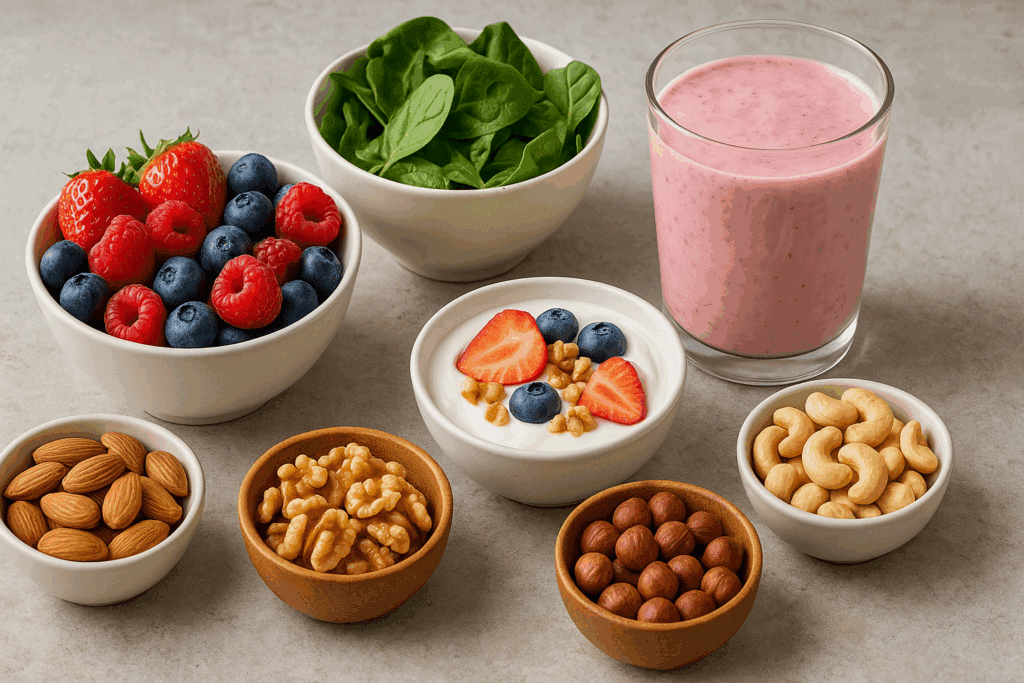
FAQ: Are Nuts Good for Brain Health? Exploring the Best Nuts for Cognitive Function, Memory, and Focus
1. How do nuts specifically impact the brain’s chemical signaling pathways?
Nuts are good for brain health because they influence chemical signaling pathways that are crucial for cognition and memory formation. The rich supply of magnesium, particularly in cashews and almonds, supports neurotransmitter activity by modulating NMDA receptors responsible for synaptic plasticity. Omega-3 fatty acids in walnuts enhance neuronal fluidity, facilitating faster and more efficient communication between brain cells. Emerging studies show that polyphenols in nuts may activate brain-derived neurotrophic factor (BDNF), a key molecule in neurogenesis. These complex interactions explain why many nutritionists recommend nuts as part of a strategy for maintaining healthy cognitive signaling.
2. Can eating nuts daily prevent cognitive decline in aging adults?
While no single food can guarantee prevention of cognitive decline, regular nut consumption appears to be a powerful protective factor. Several longitudinal studies have associated diets rich in the best nuts for brain health, such as walnuts and pistachios, with a slower rate of cognitive aging. The antioxidants, unsaturated fats, and micronutrients found in nuts reduce oxidative stress and inflammation, two key drivers of age-related memory loss. Combining nuts with other brain-supportive habits, like exercise and mental stimulation, further enhances their protective effects. In this context, nuts good for brain health are an important, accessible tool for supporting lifelong cognitive vitality.
3. Are certain nuts better for focus and attention compared to others?
Yes, different nuts may offer distinct advantages for focus and mental stamina. Walnuts, high in alpha-linolenic acid (ALA), help sustain neuronal membrane function, crucial for sustained attention. Meanwhile, almonds, one of the best nuts for brain health, provide a steady release of glucose to the brain, helping maintain energy levels without the crashes associated with refined sugars. Pistachios, rich in carotenoids like lutein, offer antioxidant benefits that help preserve mental clarity over long periods. Integrating a mix of these nuts into your diet may offer broader support for attention and concentration than relying on just one variety. These subtle differences illustrate why nuts good for brain performance are best approached with diversity in mind.
4. How do nuts compare to multivitamins for supporting brain health?
Multivitamins offer isolated nutrients in standardized doses, while nuts deliver a rich, synergistic matrix of compounds that work together in ways supplements often cannot replicate. Although multivitamins are valuable, the best nuts for brain health, like pecans and cashews, provide polyphenols, fiber, and unsaturated fats alongside vitamins and minerals. This complexity enhances nutrient bioavailability and promotes multiple pathways of neuroprotection. A daily handful of nuts good for brain health can serve as a functional food complement to a high-quality multivitamin, creating a more holistic approach to cognitive nourishment. In this way, diet and supplementation can work together rather than in isolation.
5. Can nuts support brain recovery after injury or illness?
Emerging research suggests that nutrient-dense foods like nuts may aid in brain recovery following injury or illness. High-antioxidant nuts such as walnuts and pecans combat post-injury oxidative stress, while magnesium-rich cashews support neuroplasticity and cellular repair. Moreover, the best nuts for brain health offer a steady stream of healthy fats essential for rebuilding damaged neuronal membranes. Although nuts alone are not a substitute for medical treatment, they can play a supportive role within a comprehensive rehabilitation plan. This additional recovery potential highlights yet another reason why nuts good for brain function are so highly regarded.
6. Are there specific times of day when eating nuts can boost cognitive function?
Timing can influence the cognitive benefits of nuts. Eating a small portion of nuts in the morning provides a sustained source of healthy fats and micronutrients to support focus throughout the day. Incorporating the best nuts for brain health into afternoon snacks can help combat the common post-lunch energy slump, maintaining cognitive performance during crucial afternoon hours. Evening consumption of magnesium-rich nuts like almonds or cashews may also support restful sleep, indirectly benefiting memory consolidation overnight. Recognizing that nuts good for brain health can offer different benefits depending on when they are consumed adds an extra layer of strategy to daily dietary planning.
7. What emerging research trends suggest new roles for nuts in brain health?
New research is exploring how the gut-brain axis may mediate the cognitive benefits of nuts. Prebiotic fibers found in many of the best nuts for brain health are being studied for their role in promoting beneficial gut bacteria, which in turn influence mood, cognition, and inflammation levels. Additionally, scientists are investigating how nut-derived polyphenols might protect against neuroinflammatory diseases like Alzheimer’s. The field of nutrigenomics is also examining how individual genetic variations affect responses to nuts good for brain support. These exciting developments suggest that personalized nutrition strategies involving nuts may become more common in the near future.
8. How can nuts enhance cognitive performance in stressful situations?
Stress can significantly impair cognitive function, but nutrient-dense foods like nuts can provide a buffer. High-magnesium nuts such as cashews may modulate the body’s stress response by regulating cortisol production. Antioxidants from the best nuts for brain health help neutralize oxidative damage triggered by chronic stress. Additionally, the steady energy supply from nuts good for brain health can prevent blood sugar fluctuations that often worsen anxiety and mental fatigue. Integrating a mindful snack of nuts before high-pressure situations—such as exams or presentations—could offer a simple, practical strategy for maintaining sharper focus and emotional resilience.
9. Are raw nuts better for brain health than roasted or salted varieties?
Raw nuts generally retain more of their natural antioxidants, vitamins, and healthy fats compared to roasted or salted versions. While lightly roasting nuts at low temperatures can enhance flavor without significant nutrient loss, high-heat roasting may degrade sensitive compounds like vitamin E. Salted nuts, although convenient, can contribute to excess sodium intake, potentially offsetting cardiovascular benefits. For maximizing the brain-supportive qualities of the best nuts for brain health, opting for raw or dry-roasted unsalted varieties is recommended. This approach ensures that nuts good for brain function retain their maximum therapeutic potential.
10. Can children and teenagers also benefit from eating nuts for brain development?
Absolutely. During periods of rapid brain growth, nutrient demands are especially high, making nuts an excellent food choice for children and teenagers. The best nuts for brain health, such as walnuts and almonds, supply essential fatty acids, B vitamins, and antioxidants needed for memory, learning, and emotional regulation. Regular consumption of nuts good for brain health can also support better academic performance and mental resilience in youth. It’s important to ensure age-appropriate serving sizes to avoid excessive calorie intake, and to be mindful of potential nut allergies. Introducing a variety of nuts early on helps establish lifelong habits that contribute to cognitive wellness across the lifespan.

Conclusion: Nourishing the Brain with Nature’s Smartest Snacks
In the quest for cognitive excellence, both science and tradition point to the remarkable benefits of nuts. The question “are nuts good for brain health” can now be answered with a resounding yes, supported by extensive research on their nutrient density, antioxidant capacity, and synergistic effects with broader nutritional strategies.
As multivitamin and memory studies continue to uncover the complexities of nutritional neuroscience, it becomes increasingly clear that whole foods like nuts are irreplaceable allies. By embracing a diverse array of nuts within a brain-healthy lifestyle—and complementing them with informed multivitamin use—individuals can build a strong, resilient foundation for memory, focus, and lifelong cognitive vitality.
The evidence is compelling: from almonds to walnuts to pistachios, the best nuts for brain health are nature’s smart snacks, offering delicious, scientifically validated support for mental clarity and cognitive wellness. Investing in this simple yet powerful habit may be one of the most delicious ways to nourish both mind and body for years to come.
Was this article helpful? Don’t let it stop with you. Share it right now with someone who needs to see it—whether it’s a friend, a colleague, or your whole network. And if staying ahead on this topic matters to you, subscribe to this publication for the most up-to-date information. You’ll get the latest insights delivered straight to you—no searching, no missing out.
Further Reading:
Impact of Nut Consumption on Cognition across the Lifespan
Could eating more nuts help boost memory later in life?
The Top 5 Nuts for Brain Health – A Delicious Way to Boost Your Brain Power
.Important Note: The information contained in this article is for general informational purposes only, and should not be construed as health or medical advice, nor is it intended to diagnose, prevent, treat, or cure any disease or health condition. Before embarking on any diet, fitness regimen, or program of nutritional supplementation, it is advisable to consult your healthcare professional in order to determine its safety and probable efficacy in terms of your individual state of health.
Regarding Nutritional Supplements Or Other Non-Prescription Health Products: If any nutritional supplements or other non-prescription health products are mentioned in the foregoing article, any claims or statements made about them have not been evaluated by the U.S. Food and Drug Administration, and such nutritional supplements or other health products are not intended to diagnose, treat, cure, or prevent any disease.


